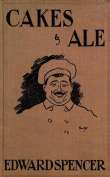class="pginternal" tag="{http://www.w3.org/1999/xhtml}a">CHAPTER XV
| |
| SUPPER |
| |
| Cleopatra’s supper—Oysters—Danger in the Aden bivalve—Oyster |
| stew—Ball suppers—Pretty dishes—The Taj Mahal—Aspic—Bloater |
| paste and whipped cream—Ladies’ recipes—Cookery |
| colleges—Tripe—Smothered in onions—North |
| Riding fashion—An hotel supper—Lord Tomnoddy at the |
| “Magpie and Stump” |
170-180 |
| |
| |
| CHAPTER XVI |
| |
| SUPPER (continued) |
| |
| Old supper-houses—The Early Closing Act—Evans’s—Cremorne |
| Gardens—“The Albion”—Parlour cookery—Kidneys fried |
| in the fire-shovel—The true way to grill a bone—“Cannie |
| Carle”—My lady’s bower—Kidney dumplings—A Middleham |
| supper—Steaks cut from a colt by brother to “Strafford” |
| out of sister to “Bird on the Wing” |
181-191 |
| |
| |
| CHAPTER XVII |
| |
| “CAMPING OUT” |
| |
| The ups and downs of life—Stirring adventures—Marching on to |
| glory—Shooting in the tropics—Pepper-pot—With the |
| Rajah Sahib—Goat-sacrifices at breakfast time—Simla to |
| Cashmere—Manners and customs of Thibet—Burmah—No |
| place to get fat in—Insects—Voracity of the natives—Snakes—Sport |
| in the Jungle—Loaded for snipe, sure to |
| meet tiger—With the gippos—No baked hedgehog—Cheap |
| milk |
192-205 |
| |
| |
| CHAPTER XVIII |
| |
| COMPOUND DRINKS |
| |
| Derivation of punch—“Five”—The “milk” brand—The best |
| materials—Various other punches—Bischoff or Bishop—“Halo” |
| punch—Toddy—The toddy tree of India—Flip—A |
| “peg”—John Collins—Out of the guard-room |
206-218 |
| |
| |
| CHAPTER XIX |
| |
| CUPS AND CORDIALS |
| |
| Five recipes for claret cup—Balaclava cup—Orgeat—Ascot cup—Stout |
| and champagne—Shandy-gaff for millionaires—Ale |
| cup—Cobblers which will stick to the last—Home Ruler—Cherry |
| brandy—Sloe gin—Home-made, if possible—A new |
| industry—Apricot brandy—Highland cordial—Bitters—Jumping- |
| powder—Orange brandy—“Mandragora”—“Sleep |
| rock thy brain!” |
219-231 |
| |
| |
| CHAPTER XX |
| |
| THE DAYLIGHT DRINK |
| |
| Evil effects of dram-drinking—The “Gin-crawl”—Abstinence in |
| H.M. service—City manners and customs—Useless to argue |
| with the soaker—Cocktails—Pet names for drams—The |
| free lunch system—Fancy mixtures—Why no cassis?—Good |
| advice like water on a duck’s back |
232-245 |
| |
| |
| CHAPTER XXI |
| |
| GASTRONOMY IN FICTION AND DRAMA |
| |
| Thomas Carlyle—Thackeray—Harrison Ainsworth—Sir Walter |
| Scott—Miss Braddon—Marie Corelli—F. C. Philips—Blackmore— |
| Charles Dickens—Pickwick reeking with alcohol—Brandy |
| and oysters—Little Dorrit—Great Expectations—Micawber |
| as a punch-maker—David Copperfield—“Practicable” |
| food on the stage—“Johnny” Toole’s story of Tiny |
| Tim and the goose |
246-259 |
| |
| |
| CHAPTER XXII |
| |
| RESTORATIVES |
| |
| William of Normandy—A “head” wind at sea—Beware the |
| druggist—Pick-me-ups of all sorts and conditions—Anchovy |
| toast for the invalid—A small bottle—Straight talks to |
| fanatics—Total abstinence as bad as the other thing—Moderation |
| in all matters—Wisely and slow—Carpe diem—But |
| have a thought for the morrow |
260-274 |
BREAKFAST
“The day breaks slow, but e’en must man break-fast.”
Formal or informal?—An eccentric old gentleman—The ancient Britons—Breakfast in the days of Good Queen Bess—A few tea statistics—“Garraway’s”—Something about coffee—Brandy for breakfast—The evolution of the staff of life—Free Trade—The cheap loaf, and no cash to buy it.
This is a very serious subject. The first meal of the day has exercised more influence over history than many people may be aware of. It is not easy to preserve an equal mind or keep a stiff upper lip upon an empty stomach; and indigestible food-stuffs have probably lost more battles than sore feet and bad ammunition. It is an incontestable fact that the great Napoleon lost the battles of Borodino and Leipsic through eating too fast.
When good digestion waits on appetite, great men are less liable to commit



